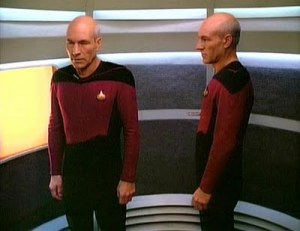I’m examining the impact Star Trek: The Next Generation had on my formation. The introduction to this series can be seen here.
Picard is stunned when a version of himself from 6 hours in the future arrives, bringing warning of the Enterprise’s destruction.
Though some complicated science – a “mobius”, or twist in time and space – Picard comes face to face with himself, in the most literal sense. He meets another him, the two separated only by a few hours worth of decisions made and events experienced.
 The “later” Picard is foreign to the Picard from our time. He has left the Enterprise during a crisis once, and badly wants to leave it again. He seems locked into one course of action and can’t see alternatives. He has seen his Enterprise destroyed, and is undone. Seeing this uncharacteristic behavior in himself is unnerving for our Picard. It presses him into fears of hesitation and second guessing himself. Right as he most wants something he can be decisive about – something that can release the tension of uncertainty and prove he has not lost his steeliness – right then the problem that they’re heading toward remains frustratingly unclear and impossible to act on. This episode is a character study in how Picard reacts to helplessness.
The “later” Picard is foreign to the Picard from our time. He has left the Enterprise during a crisis once, and badly wants to leave it again. He seems locked into one course of action and can’t see alternatives. He has seen his Enterprise destroyed, and is undone. Seeing this uncharacteristic behavior in himself is unnerving for our Picard. It presses him into fears of hesitation and second guessing himself. Right as he most wants something he can be decisive about – something that can release the tension of uncertainty and prove he has not lost his steeliness – right then the problem that they’re heading toward remains frustratingly unclear and impossible to act on. This episode is a character study in how Picard reacts to helplessness.
It’s also what’s referred to in the trade as a “bottle episode†– to keep to a smaller budget this week there’s no guest star, no new sets or expenses. The script sticks to the regular cast playing out the story in known spaces… and the writers use this restriction to its advantage, contributing a slight sense of emotional claustrophobia that matches the action. The two Picards have been forced into closer contact than they should have, with a crisis of unknown origin bearing down on the whole ship before they understand it. Other than a single, noticeable awkward moment2, the entire rest of the episode is a tensely well-constructed series of conversations. They are prevented from acting more often than they can act.
Watching it the first time, I mostly experienced it as a taut thriller. I wouldn’t yet get the layers of psychological trouble for Picard that are much keener for me as an adult. But one part that stood out for me then was the unexpectedness of this exchange, as our Picard and the doctor discuss the restrained future Picard:
Picard: Release him.
Pulaski: Do you know what you’re doing?
Picard: No. Release him.
Picard is honest in his lack of knowledge, lack of insight, lack of surety, even as he struggles to maintain his internal sense of authority. He also still expects his orders to be followed. This moment of deliberate vulnerability in a leader is quite compelling.
As the climax nears, Picard expresses a value that is deeply meaningful to me. It’s clear from the future Picard’s information that the Enterprise tried escaping this problem once before, and was destroyed. Our Picard then works on the assumption that there must be another option. If one choice doesn’t work, there is no doubt in his mind – or at least not in his working method – that there mustbe another way, and he must find it. While he manages to tolerate the reality of helplessness, he does not let it turn to a sense of hopelessness. I learned a LOT of hopelessness in my family of origin; it was programmed far deeper than conscious thought. Even when, as an adult and after decades of practice, I wisely and compassionately avoid hopelessness as a response to stress, it’s only because of careful habits on my part… not because that option has ceased to be readily available in my internal landscape. Picard here offers some of my first experiences with doggedness and determination that I could relate to, and that became important to me.
1. From http://friday87central.wordpress.com/2011/06/24/thebottleshow/
2. In what I think is an attempt to heighten the tension, Pulaski jumps the gun on discussing her capacity to strip Picard of his command. It comes off as annoying posturing more than contributing significantly to the graver tension of the piece.
Leave a Reply